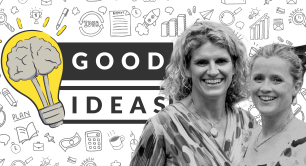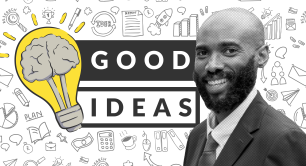Good Ideas: How Daryl Chambers went from hating fighting to using martial arts to support young people
Cambridge Social Innovation Prizewinner Daryl Chambers, founder of InPower Academy, believes the philosophical and spiritual side of martial arts means it can be a more effective vehicle for supporting young people than other sports.
Daryl Chambers’ first experience of martial arts was not a good one. Aged seven, his dad took him to a Muay Thai session, where he ended up in the ring, sparring with his brother.
Chambers says: “I absolutely hated it. It was Anthony Joshua vs Fury, the way everyone was watching. I remember coming out and being like ‘I don’t like that, Dad. I don’t even fight my brother at home.’”
So, how did the seven-year-old who was more into reading than sports end up founding InPower Academy, a community interest company (CIC) which uses martial arts to support young people from underserved communities?
Growing up in an area of high deprivation and gang activity in Wolverhampton, in the midlands of England, Chambers was arrested at 17. He credits the community and network he developed through a boxing gym, as well as the support of his mum and dad, with redirecting his life along a different path.
With the Eastern philosophical practices which we ingrain, we are building people holistically
The social benefits of sports for young people – including communication skills, leadership, discipline – are well documented. But Chambers believes martial arts has even more to offer young people, because of its emphasis on Eastern spirituality and philosophy.
He says: “There’s a level of mindfulness that you need that keeps you present and focused on exactly the task at hand. It transcends the physical and, with the Eastern philosophical practices which we ingrain, we are building people holistically.”
‘I come from where you come from’
Chambers founded InPower in 2012 and registered it as a CIC in 2016, with the aim of delivering that same support network to young people in similar circumstances to those he had faced. Based around martial arts and free of charge to the young people taking part, InPower’s sessions aim to build personal growth, resilience, self-belief and positive behavioural change.
The organisation supports around 240 young people each week, with about 70% of its work delivered as either group or individual early intervention programmes in schools. In addition, InPower holds community martial arts sessions across the Black Country region of England, runs an alternative education provision for young people in need of a break from mainstream education and delivers anti knife crime workshops for primary schools.
InPower’s work has been shown to reduce young people’s antisocial behaviour by 6% in six months, Chambers says. He shared three examples of young people who have been supported by InPower to demonstrate the effectiveness of its work.
As a 15-year-old, Cameron Baines was aggressive at school and causing trouble in his community following the death of a family member. He was one of the first young people supported by InPower and now, 10 years later and with his life turned around, he works for the organisation as the head of its alternative education provision.
InPower’s anti knife crime workshops have been developed in part by a young man who was stabbed seven times as a 15-year-old. Chambers said he called the young man when he was stable after the attack and the teenager told him: “I want to make sure no young person ever gets in this position that I’m in right now,” which led to the development of the workshops.
Another young person, named by Chambers as ‘Nico’, attended an InPower school assembly. Following the assembly, Nico started to attend InPower’s community sessions, then became a volunteer. Although he wasn’t interested in martial arts, Nico told InPower he was seeking a positive peer group and community.
Chambers says: “I’m not saying every young person that engages with us is going to work for us. But the message of these [young men], when they’re in front of other young people, is, ‘I come from where you come from. I was referred on to this programme.’ And that message, to me, is beautiful.”
Maintaining sustainability to ensure consistency of support
In January, InPower secured its first social investment: £180,000 (50% grant funding, 50% repayable loan) from Social investment Business to expand the organisation’s capacity. InPower has already used the investment to hire a “trailblazing” COO and is recruiting an early intervention officer.
Most of InPower’s traded income comes from delivering programmes in schools, while grant funding and donations from participants or their parents who are able to contribute enable the organisation to keep the community sessions free of charge for those who can’t afford them.
It’s important as social entrepreneurs we never get caught up into the thing of ‘funding, funding, funding’
Chambers says because the young people InPower supports need consistency in their lives, he feels additional responsibility to maintain the organisation’s traded income and sustainability.
He says he has seen other CICs become reliant on grant funding then be forced pause their work when funding runs out. A stop-start approach based only on grant-based income would undermine InPower’s work.
Chambers says: “It’s important as social entrepreneurs we never get caught up into the thing of ‘funding, funding, funding’. Sometimes we have to think, How can we be self-sustainable? And we’ve worked out a really good model.”
|
The Cambridge Social Innovation Prize The Cambridge Social Innovation Prize celebrates social impact through business across the UK. It is a prize for mid-career social innovators. Rather than targeting the rising stars or presenting lifetime achievement awards, it recognises those with potential to grow their impact who could use support to get to the next level. It is delivered by Trinity Hall and the Cambridge Centre for Social Innovation. Winners of the Cambridge Social Innovation Prize are selected for their achievements and potential in creating positive social impact for individuals and communities in different parts of the UK. These awards are made annually to extraordinary founder-CEOs of scale up social enterprises to support their growth as leaders. The Cambridge Social Innovation Prize includes a £10,000 cash award for personal and professional development. Additionally, mentoring from experts from Cambridge Social Ventures at Cambridge Judge Business School and support from an expanding community of social innovators at Trinity Hall help the winners to develop the skills, resources and networks they need to create more impact.
|
An ethos of lifelong learning
As well as expanding InPower’s work through social investment, Chambers plans to deepen his knowledge of Eastern philosophy and spirituality this year, thanks to the support of the Cambridge Social Innovation Prize.
Chambers won the Cambridge Social Innovation Prize in 2024. The prize includes a £10,000 award for personal and professional development. In October of this year, Chambers will use his prize to travel to Japan, China and Thailand to visit martial arts dojos and monasteries, to research Eastern martial arts and related philosophy.
In martial arts, you start out a white belt, and then you work up until you get to a black belt, and that’s fine, but what we try to say to everybody is that we’re white belts for life, because we always need to be willing to learn
He believes deepening his knowledge in these areas will enable InPower to better support the development of the young people the organisation works with.
He says: “I’ve been a student of Eastern martial arts philosophy – Bruce Lee, Sun Tzu, Confucianism – but from a distance. This is going to close that distance and allow us to impact thousands of young people.”
The trip will also take in the Social Enterprise World Forum in Taiwan, where Chambers hopes to learn from his peers, network and increase his understanding of the social enterprise sector.
And Chambers believes an ethos of lifelong learning is another value martial arts can deliver to the young people InPower supports. He says: “In martial arts, you start out a white belt, and then you work up until you get to a black belt, and that’s fine, but what we try to say to everybody is that we’re white belts for life, because we always need to be willing to learn.”
This content is brought to you by Pioneers Post in partnership with the Cambridge Social Innovation Prize, a collaboration between Cambridge Centre for Social Innovation and Trinity Hall.

|
|





